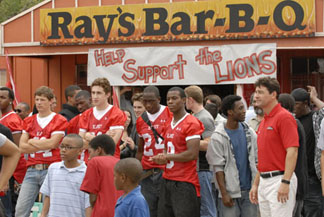Mythology: Friday Night Lights
By Martin Felipe
February 17, 2010
BoxOfficeProphets.com

In fact, I'd say Sunnydale is a pretty close analogy for Dillon. Much has been written about Friday Night Lights, assuring non-sports fans that the show really isn't about football. I don't want to dwell too much on such familiar territory, but I can vouch for this personally. I may be one of the few contributors to this site with little interest in sports. I don't hate them or anything. They're just not my cup of tea. When I heard that Peter Berg's 2004 film Friday Night Lights was to become a series, I dismissed it. When the adoring reviews started rolling in, I eventually acquiesced and caught up with the show on hulu.com. And I'm glad I did.
Football is a backdrop to the story, not the story itself - kinda like the vampires of Sunnydale. Both shows are really more concerned with exploring coming-of-age themes and examining the closed community of small-town USA. Yes, there are linebackers and demons, but they provide the context within which Berg and Whedon tell their stories. To be academic, they are symbols, allegories for what really interest them, life in high school, and in small American towns.
The storytelling style of the two shows is even similar. Each television season tells a story, with minor plot threads carrying over between seasons, weaving them all together into a larger narrative. Lights lends itself well to this structure, with each year telling the tale of an individual football season. For that matter, Buffy's Scooby gang, an revolving team of misfit demon fighters, is pretty similar to the rotating lineups of high school football teams.
Now Buffy was always a bit of a success story. It wouldn't have lasted long on CBS, but the evolving television landscape of the last 20 years or so provided it a home in which it could flourish on the tiny WB Network. There is a growing abundance of critically acclaimed ratings duds with passionate fan bases finding ways of surviving in the inhospitable Nielsen wilderness, and Friday Night Lights fits the bill. After it barely squeaked out a second season renewal due more to prestige than viewers, the now legendary writers strike shortened the season, pretty much ensuring that the sophomore season would be show's last.
Then, another in a series of deals struck to save struggling critical darlings, Direct TV agreed to split the bill on a 13 episode third season with NBC. First, the season would air on Direct TV, then re-air on NBC. The ratings didn't really improve, but the acclaim was good for both entities, and, with a split price tag, it was apparently cost affective enough for them to commit to two more 13-episode seasons.
The fourth season just ended its Direct TV run and will air on NBC soon. Bad news came down last week that the two-season order will indeed be the show's swan song. Nevertheless, with some 75 or so episodes in the can, it's had a respectable run. It's provided five years of acclaim for NBC, a network that sorely needs it, given further evidence that television has the ability to provide quality programming, and will likely - if season four is any indication - go out on a creative high, without overstaying its welcome. It also opened my mind up a bit. I don't need a Dharma Initiative or a Battlestar Galactica to enjoy a quality show. All I really need is the quality.